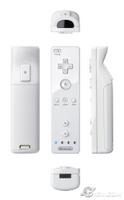OK, so... I lied.
I'm not one for beating a dead horse, but when it came column time this week I was still thinking about that damn Revolution controller. At the beginning of my last post I said I wasn't going to explain how it worked but I did for the article. Because they edit it down for the paper I'm still going to put it up here, but it contains a lot of what is written below. Just a warning.
Click here for the Daily Cardinal Version
September 21, 2005
 Last week, after months of waiting, Nintendo finally revealed the controller for their next generation game console, code-named Revolution, at the Tokyo Game Show. And after months of waiting two things became apparent; all the speculation on the controller in the gaming community over the last half year was nowhere close to what we saw and Nintendo may have finally gone completely insane.
Last week, after months of waiting, Nintendo finally revealed the controller for their next generation game console, code-named Revolution, at the Tokyo Game Show. And after months of waiting two things became apparent; all the speculation on the controller in the gaming community over the last half year was nowhere close to what we saw and Nintendo may have finally gone completely insane.
It’s evident from Nintendo’s recent endeavors in hardware and game play that they have entirely lost interest in competing with Microsoft and Sony on a purely “top hardware lots of software” business model. Exhibit A: the bongo controller for several GameCube games. This input device allows characters to be controlled on screen with rhythmic tapping and clapping. Exhibit B: the Nintendo DS. This handheld comes equipped with everything you’d expect, plus an additional display that has touch-screen capabilities and a microphone for audible input. Though not many games have taken full advantage of the hardware it showcases Nintendo’s wanting to take game interaction to another level.
Finally exhibit C: the Revolution controller. The controller resembles, and is held like, a television remote. There is a trigger underneath and a few face buttons and a D-pad on top. What makes this controller really different, as though it weren’t off-beat enough, is its ability to convey its position in three dimensions relative to the television screen to the Revolution. It does this through sensors placed on the TV and in the controller itself.
This has the potential to affect game play in radically new ways. Imagine playing the next Zelda game and instead of pushing a button to swing your sword you actually have to move your arm. The same for baseball and tennis games could be applied. Or perhaps holding the controller upright it could be used as a flight stick for plane combat games. Put another controller in your other hand and play a virtual drum set.
With several additions to the controller Nintendo has hinted at even more will be possible. At TGS Nintendo President Satoru Iwata also unveiled an analog stick attachment. This left hand device is tethered to the bottom of the other controller and could be used in conjunction with the remote side. The first person shooter genre may see the most use out of this setup. For example, the player could control their character’s position with their left had and their weapon facing and aiming by pointing at the screen with their right.
The possibilities are as far reaching as the developers’ imagination. But some big questions have yet to be answered. Will anybody want/be able to develop for the Revolution? Many game companies may choose to focus their efforts on safe, proven methods of game play that Xbox 360 and PS3 will offer. Will the control be as precise as a standard controller for twitch-based games like Halo? When speed and accuracy are everything in a game can this wireless wonder deliver?
Finally, will there be a market for the Revolution? Nintendo is expected to be last to market with this hardware and may very well find out that many potential customers have purchased a 360 or PS3. Nintendo thinks this won’t be the case and that they’ll also be able to tap a market of people that haven’t played video games yet or were alienated by their complexity long ago.
All these things remain to be seen. Nintendo could be right and may very well revolutionize an industry that is stagnating right now. They have in the handheld market by outselling the PSP by nearly 2 to 1. Will their luck carry over to the next generation? Time will tell.

0 Comments:
Post a Comment
<< Home